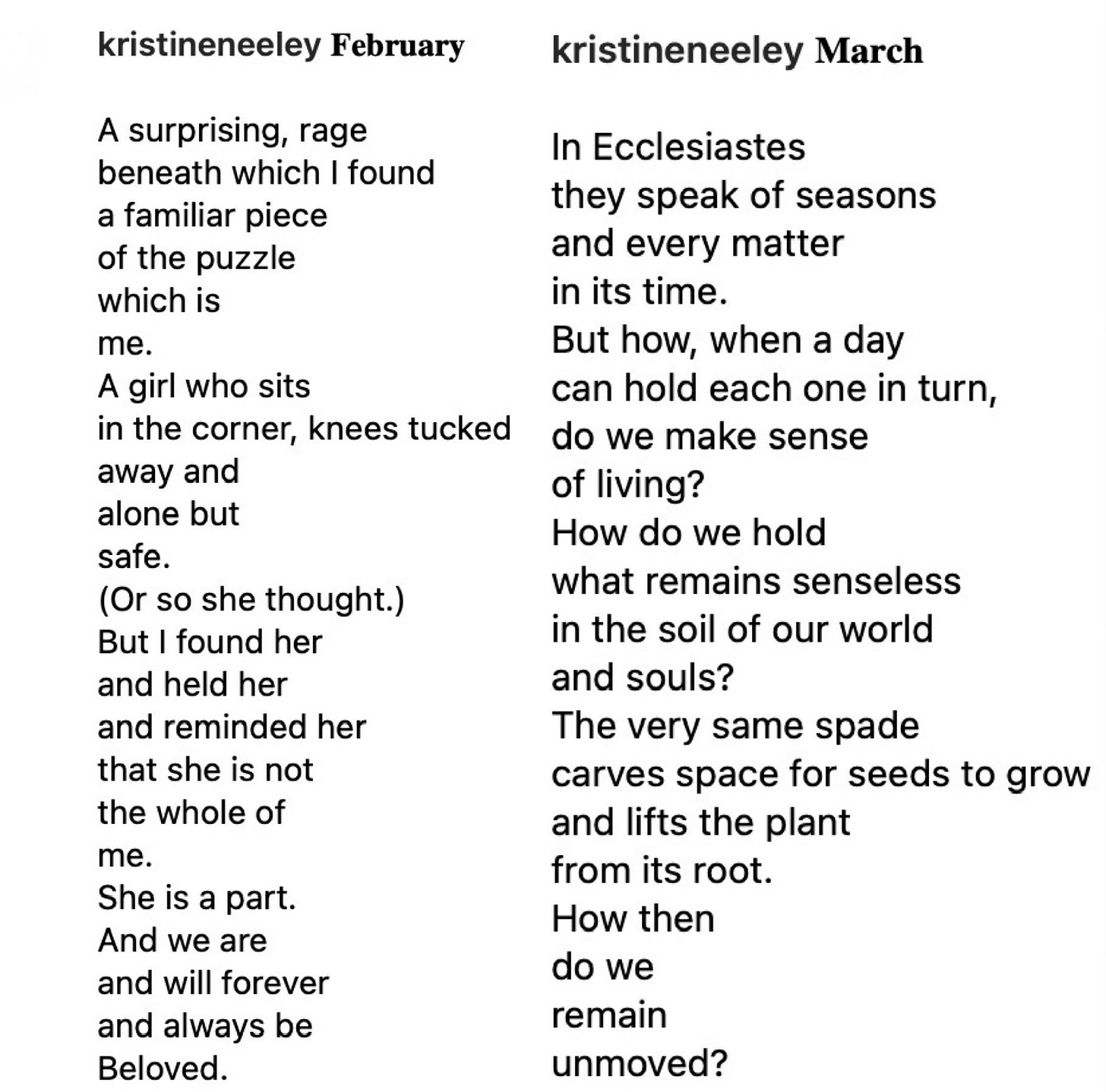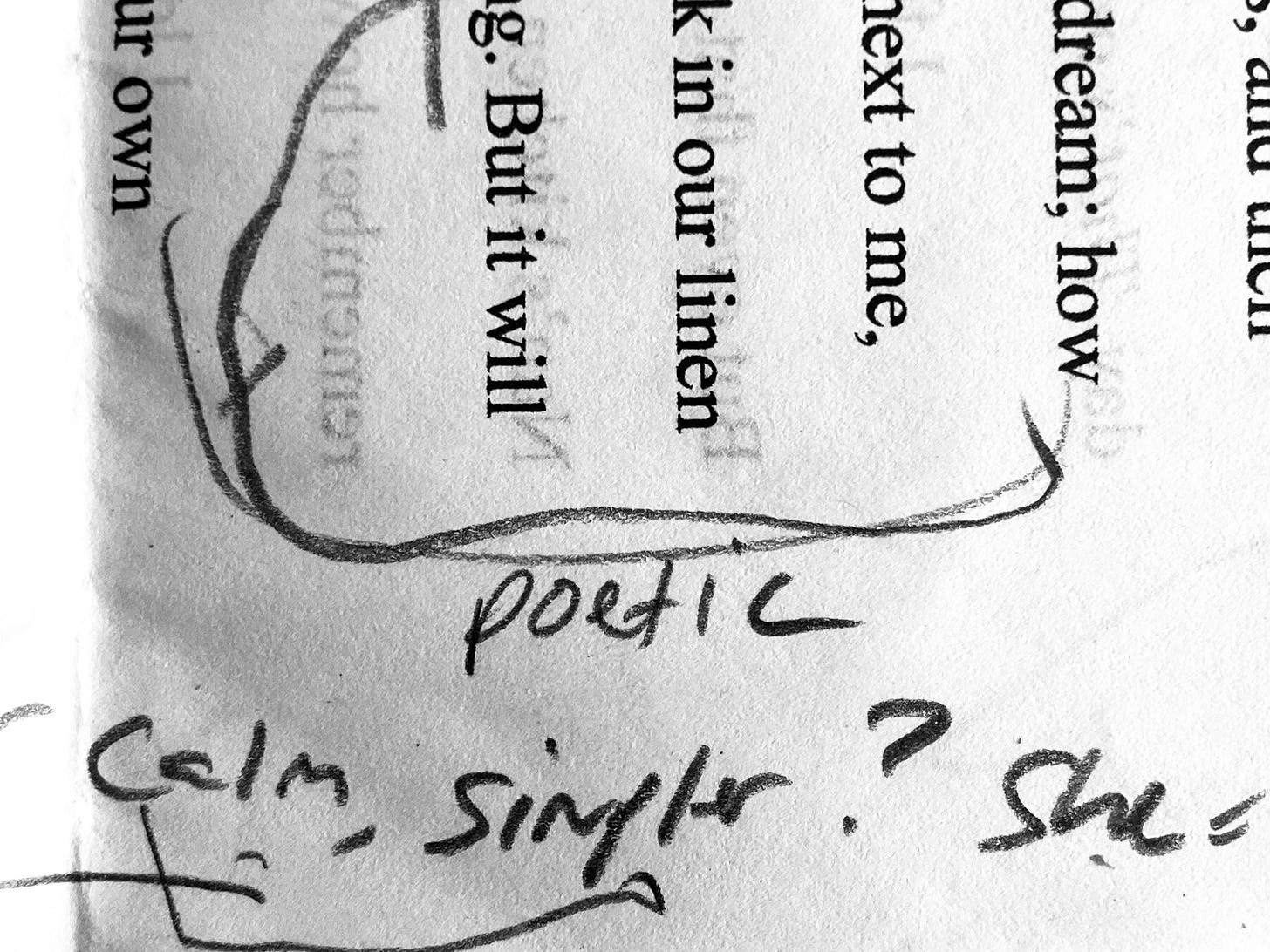My Pen in the Air is a newsletter from the desk of an unexpected novelist filled with essays, poems, short stories, and monthly updates on life, writing, and more. Every post goes out entirely free to all readers (though you may opt to further support my writing through a paid subscription). // Sign up here:
My first memory of a poem is an outline, its insides fuzzy, but its permanence irrefutable. It was the first moment I didn’t just think, but instead believed, I was a writer.
I was in school, some indeterminate grade, and a teacher, who knows which one, suggested I consider submitting a poem I’d recently turned in for class into a contest: The Ring, I think it was called, or perhaps A Ring.
I remember scratching it out on paper with a graphite pencil, school bus yellow, and making edits again and again until I felt it was just right. It was a poem that swallowed the page line after line, but I can only recall one of them, faintly:
A circle within a circle.
Riveting, I know.
I was wrestling, even at a young age, with the impermanence and instability of my upbringing, of divorces, of change; rings and circles like foreign concepts to me. And I remember the short, sculpted magic of a poem to somehow make it all make a little more sense.
That poem won me a spot in the publisher’s anthology of that year’s winners: fellow students across the country whose poems had also been chosen.
Of course, I didn’t know it at the time, but it was a bum deal that not only could we not afford to purchase a copy of my first published work, it turned out to actually be somewhat of a racket. And quite widespread, at that. These amateur or vanity poetry anthologies were a dime-a-dozen, but thankfully I discovered that much, much later.
From that point, I kept reading and writing poetry, both with the assurance that I’d been chosen but not with any sort of conviction. It wasn’t until coming to faith as a teenager and discovering the Psalms in scripture that poetry took on a place of practice and dare I say, purpose, in my life.
I wrote poems to pass the time, to give as gifts, and give structure to the so-very-many-things I tended to think and feel about in any given day.
At fourteen, I was given my first guitar, and soon, poems became songs. Whole pages full of heart poured on the page, grappling with the my world and its place within the larger one, only this time with repeating stanzas turned into choruses.
That season of my life changed everything, ultimately charting the course that landed me where I am, quite literally, today.
Except, shortly after arriving in Music City, the songs left and, with them, the poems. Somewhere along the way, verse had gone the way of the verses, quietly tucked into the recesses, the back burners, the less-important-thans of my life.
Whether I believed them to be frivolous, fruitless, frittering, or all of the above — the truth is, I simply stopped, and it would be years before I’d realize what I’d lost in doing so.
“Presently the tactful Mole slipped away and returned with a pencil and a few half-sheets of paper which he placed on the table at his friend’s elbow.
‘It’s quite a long time since you did any poetry,’ he remarked. ‘You might have a try at it this evening, instead of—well, brooding over things so much. I’ve an idea that you’ll feel a lot better when you’ve got something jotted down—if it’s only just the rhymes.’
The Rat pushed the paper away from him wearily, but the discreet Mole took occasion to leave the room, and when he peeped in again some time later, the Rat was absorbed and deaf to the world; alternately scribbling and sucking the top of his pencil. It is true that he sucked a good deal more than he scribbled; but it was joy to the Mole to know that the cure had at least begun.
— Kenneth Grahame, The Wind in the Willows
In this more enigmatic chapter from the book, entitled “Wayfarers All,”1 Rat (also known as the Water Rat or Ratty) — who is a generally contented, though wise and worldly homebody — has been presented with not just one but two encounters which have proven to shrink his beloved world. He was made to feel his life was small, replacing what was once a wholehearted devotion with doubt.
Without understanding at all what has transpired this day, Mole finds his dear friend dazedly departing his hole on the riverbank, very unlike himself. Mechanical and murmuring, the Rat has become an altogether different animal.
Mole didn’t know how the sparrows had spoken to Ratty of heading south to longer days and a warmer sun. Mole couldn’t understand how the Sea Rat had told such stories of his ocean voyages that Rat simply believed he must leave and follow, though he knew not why.
But Mole knew his friend well enough to grab the pencil and paper, tethers to a practice that simply made Rat who he was. And Rat began to return to himself.
Over the years, I still found anchor in occasionally reading poetry, sometimes procuring favorites — especially Mary Oliver, Rainer Maria Rilke, or John O’Donohue — for my Instagram captions. I was all but stymied in expression.
For more time than I’d like to admit, creatively I’d been enticed, glazed over, not unfeeling, exactly, but not quite like myself. After shuttering my photography business for many early years of motherhood, I’d relegated my life to four square inches of expression and maybe an artful caption if I felt up to it.
I can see that as enough, maybe, but I know deep down that I was at times more interested in observing the “southward call” of those passing — or scrolling — by along my path to significance, more than paying attention to what was really going on inside of me.
I’d somehow come to believe that showing was the point of my creative endeavors, shrinking them in the process. But like spiritual disciplines, these creative disciplines aren’t meant to be seen at all times — shared, maybe, occasionally to light the path — but not shown, instead, to block it.
Writing my first novel in late 2018, early 2019 reminded me what it felt like to create alone in the dark, in a good way. To see the spark of words on the page and let them burn, not for the world to see, but for the story’s sake — word by word.
So it was novel writing, yes, that began “the cure.”
But it was also playing music again, trying to learn French, rediscovering art, getting outside with our children, observing them write and recite poetry for school at home, and more that helped to close the circle further.
After losing Wendell in January of 2023, my only words for that month — apart from a separate tribute to him — were a poem. Fitting, as Wendell, was a poet. Full stop. And not for any other reason except to bring himself and those around him joy. Every birthday, every special event, he’d craft rhymes on ruled paper in his iconic handwriting that were fit to make your heart burst, if not your voice with laughter.
I wrote another in February, and then another in March.
My intention was that I’d mark each month with a poem to go along with ten favorite photos, not highlights. And then I left social media again in April, finding myself creatively depleted in every possible way and needing the summer to be restored.
At a writing retreat late last summer, something shifted and I realized that what were desperately trying to surface were the very practices that had shaped the very fabric of my life, those that were built in the secret, quiet places my life, not for public consumption first, though perhaps later.
One word simply written among many other thoughtful and pondering ones, lines and stars marking points and words of interest and curiosity, made me stop in my tracks at the close of that delicious and definitive week.
A new writer friend, poet and novelist
2, had used a word for my work I’d not dared to fully hold in my hands for decades. I’d made small attempts, I believe, that were but the tiniest ripples on water now stirred daily by Wind.To be named, is a powerful moment, and those conversations with C.I. that week offered me a permission I’d been afraid to give myself. To be the poet, at heart, whose writing can only live its “best life” lyrically, because that’s my voice.
It doesn’t land for everyone.
But it lands for someone, not the least of which is me.
And with that permission, I’ve been working my way towards those moments where, like Rat, my days are “alternately scribbling and sucking the top of [my] pencil” immersed in work that both is at times prose, at times poetry, and often times both.
And it feels, I must say, quite astonishing to be here.
Instructions for living a life:
Pay attention.
Be astonished.
Tell about it.
-Mary Oliver, from “Sometimes”
Onward (and back again),
Imagine my surprise, turned delight, at finding — on the pages of the bedtime story I’ve been reading for weeks to my boys — the template for this piece. Synchronicity, much?
C.I. has written an incredible collection of poetry called The World Black, Beautiful, and Beast, and ten pages of his novel in progress were one of my favorite things I read all year, last year.












Kristine, I wish I could have read and responded sooner. What a powerful read. I don’t have the vantage point of your side of our first exchange to feel truly the cure you were recovering in poetry last summer. It seemed utterly evident to me that you were already doing the curing with your poetry, in writing and person. I read the two poems dedicated to Wendell, and I recognize that healing touch in your words. I agree with you, somethings only poetry can speak to. And yes, you capture poetry’s essence so well in this essay, especially when you say you first wrote poetry of belief, and then even more after belief. For isn’t the poet essentially a pure believer? One who sees rainbows in the storm, but not because she is disillusioned or even more common disconnected but believes in the promises they hear singing in the thunder?
So far, I think the common denominator of so many of these essays of yours is the strength of belief, which only the poet knows best because it’s a strength of attention, of deep care, a strength of healing, slow, deep, careful, the stuff of angelic power.
I’m going to try my best to catch up on the essays of yours I have missed, and I look forward to more of your poetry and fiction. Peace, friend.
I didn’t realize Wendell was a poet! What a gift his words must be.
What a gift YOUR words are ♥️